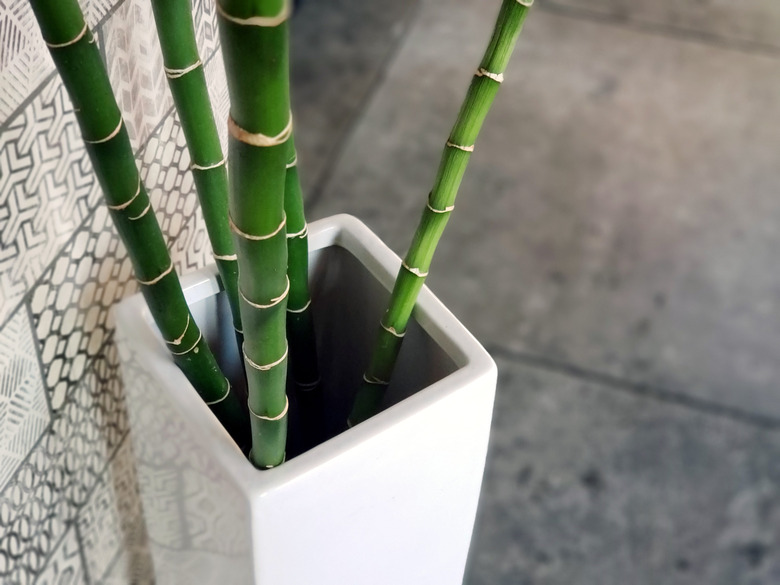Homemade Bamboo Plant Fertilizer
We may receive a commission on purchases made from links.
Fertilizing your houseplants as well as your garden is important for healthy growth. Fertilizing your plants will provide them with the specific nutrients they need to thrive and look their best. Some plants may appear as though they do not need fertilizer; however, this is not the case. Bamboo (family Poaceae, subfamily Bambusoideae) is a common houseplant, but what some bamboo owners may not know is that this plant needs to be fertilized regularly like any other.
Selecting the Proper Fertilizer
Selecting the Proper Fertilizer
Choosing the right fertilizer for your bamboo plant should not be a difficult task. Bamboo plants are members of the grass family, so naturally any fertilizers you apply to your grass would be accepted by the bamboo plant. Unfortunately, many fertilizers for your lawn include harsh chemicals, which are always best to avoid, especially if the fertilizer is going to be applied to an indoor plant. The good news is that there are several natural options that will also help your bamboo get the healthy growth it deserves.
Nettle Tea Fertilizer
Nettle Tea Fertilizer
If you prefer to make your own fertilizer, you could always look into brewing a batch of tea made from stinging nettles (Urtica dioica) to help feed your bamboo plant. Bamboo needs high concentrations of nitrogen to flourish, which is found in nettles.
To use this method, you must brew your own batch of nettle tea at home. While you might associate brewing tea with something to do in your kitchen, this tea should be made outdoors — a short distance from your home, as it could begin to have an unappealing odor over time. It is also important to wear gloves during the process since nettles can cause skin irritation.
To make your tea, begin by using 1 kilogram (2.2 pounds) of nettles, including both the leaves and the stems, with 128 ounces (16 cups) of water. The nettle leaves must be bruised, which simply means you should bend or fold the leaves until you see a wet crease appear on the surface of the leaf. After the leaves have been bruised, chop them and fill a bucket approximately three-fourths of the way with the chopped leaves and water. Stir the mixture every day for about two or three weeks until you notice a strong odor coming from the tea.
Note that this fertilizer is concentrated and should be diluted in the water you use to water your bamboo. You can also use a nondiluted version in a spray bottle on the bamboo leaves. Nettle tea fertilizer can be used to fertilize other houseplants or garden plants as well. Just make sure to verify that the plant you wish to use the fertilizer on requires the same nutrients that are found in the tea.
Compost or Manure
Compost or Manure
An excellent and all-natural fertilizer that bamboo plants respond extremely well to is organic compost. Applying natural fertilizers is easy. Simply spread some compost or well-aged manure on the top of the soil surrounding the shoots. By watering the plant afterward or putting it outside in an appropriate area before it rains, you'll activate the nutrients offered by the fertilizer. The fertilizer will begin to release the nutrients into the potting soil, allowing the bamboo to absorb what it needs.
The best time to fertilize your bamboo plant is during spring. You should apply a generous helping of fertilizer in mid to late spring because this is usually the season during which you will begin to see the most growth or new shoots on your bamboo plant. For most bamboo plants, this period of new growth is the ideal time to fertilize because the soil needs some time to absorb the nutrients before distributing them to the bamboo.
